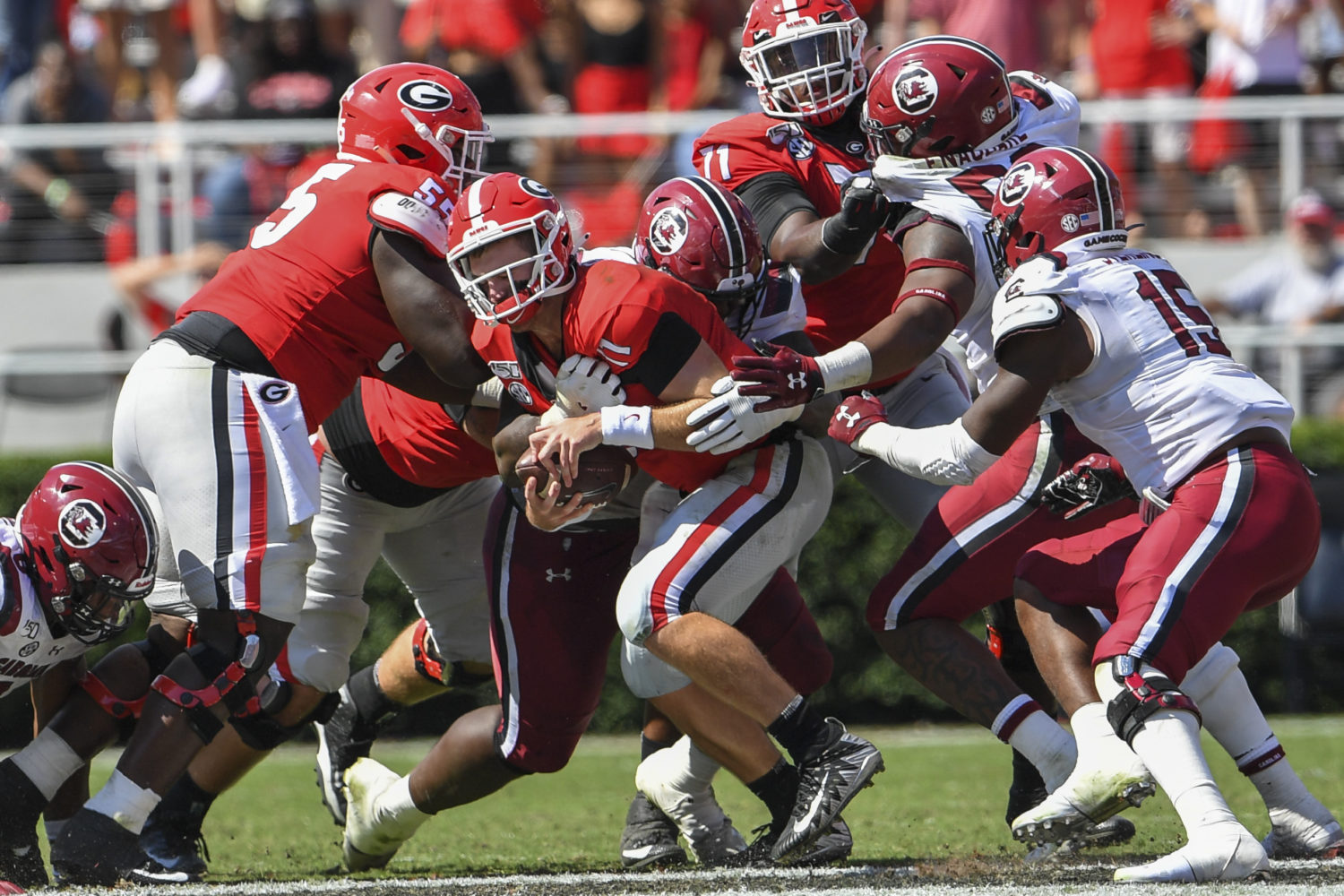
Georgia football: Time for Jake Fromm to take more shots downfield?
By Sydney Hunte
Published:
It seems that I’ve been seeing a little more discussion about Jake Fromm’s role in the Georgia offensive “system” under offensive coordinator James Coley after its loss to South Carolina. It’s a fair one to have as it was, frankly, as poor a game as Fromm has had in his college career.
One interception — the first one he’d thrown all season, returned for a touchdown by Israel Mukuamu — turned into 3, the most he’s ever thrown in a single game. He was sacked 3 times, unusual in that the Dawgs’ offensive line had given up just 1 sack all year heading into Saturday.
Not all of that is on Fromm, however. Kirby Smart called out his offensive line in his postgame press conference, hopefully a clear message that is heard loud and clear and that carries on to not just the next game against Kentucky, but throughout the rest of the season.
But is Coley putting Fromm and the Georgia offense in the best position to succeed?
Consider that against South Carolina, Fromm’s longest pass play was just 33 yards. For the season, his longest pass play has been a 60-yard touchdown to Dominick Blaylock against Arkansas State, but that was on a short pass to the right that saw Blaylock shake off his defender and turn it upfield for the score. The ball was in the air 4 yards.
Dominick Blaylock @domblaylock_1 to the House!!!!
#GoDawgs pic.twitter.com/403KeMBQiW
— OO (@_OOLLIE_) September 14, 2019
Fromm’s biggest strength is his ability to make those kinds of direct, accurate passes to gradually work the ball down the field. As defenses are able to adjust to those kinds of plays, though, that shifts the focus of the offense toward putting the ball in the hands of D’Andre Swift and Brian Herrien to gain yards on the ground. As that happens, and if Swift and Herrien are able to run the football effectively, that naturally means that opportunities open up for the passing game as opponents are more apt to guard against the run.
And that’s part of why Coley is getting some heat after the loss to the Gamecocks.
Instead of opening up the playbook and allowing players like Blaylock, George Pickens, and Lawrence Cager (who was limited a bit due to injury) to try to make plays farther upfield with Swift and Zamir White (in for an injured Herrien) held to relatively limited damage, he stuck with what turned out to be a rather predictable game plan.
I’m not the only one that thinks that the playbook needs to be expanded, by the way. This guy might know a little more than I do:
Georgia RB D'Andre Swift blunt when asked about offense today when defenses stack the box. "I think we need to take more shots downfield. Try to get the ball to our playmakers in space. Whatever the coaches think that might be." Also favors going uptempo more.
— Marc Weiszer (@marcweiszer) October 14, 2019
Sure, maybe that accuracy number goes down a little with more deep throws (I’m not advocating for Fromm to go full gunslinger), and, perish the thought, he might get picked off a few more times, but a quicker rhythm and making a few calculated risks downfield can eventually pay off.
Fromm ranks 9th among SEC starters in completions of 20 or more yards. He has 14. Tua Tagovailoa leads the way with 36. Joe Burrow is next with 33. Even Auburn freshman Bo Nix has 21.
Fromm is 5th in completions of at least 40 yards. He has 4. Burrow (9) and Tagovailoa (8) pace the league, but even Vanderbilt’s Riley Neal has more (5). And his only completion to go at least 50 was the play to Blaylock.
Why not design some go routes down the sideline and let your receivers make plays? Fromm does best when his offensive line holds up and allows him time to work, but often he checks to his nearest receiver instead of fully surveying his options. Keep in mind, too, that he’s thrown 35 or more passes only 5 times in his career. He’s lost all 5 times.
And that’s why Fromm has never been fully able to shake that “game manager” reputation.
Don’t get me wrong: He’s still a good quarterback who has intangibles others lack. He can put up solid numbers and will stay in the NFL Draft discussion. But is the play-calling of Coley (and, by extension, Smart) limiting Fromm from what he can truly do?
The answer to that question could play a role in deciding the trajectory of the remainder of Georgia’s season.
Sydney is an Atlanta-based journalist who has covered everything from SEC and ACC football to MLS, the U.S. men's national soccer team and professional tennis. His work has appeared on such platforms as SB Nation, Cox Media Group and FanSided.







